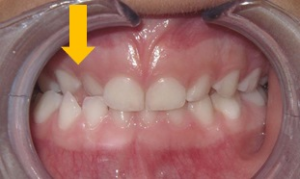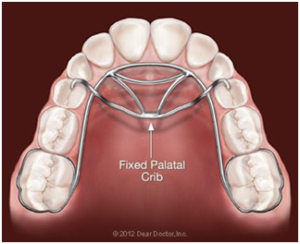
Why to Stop Thumb Sucking
Stop thumb sucking and prevent irreversible oral deformities, among other issues. This is the official statement according to the American Academy of Pediatric Dentists (AAPD) and the American Dental Association (ADA).
This habit is considered to be natural and healthy until the age of three, but if your child continues finger sucking after this period it can cause various dental and speech problems. If thumb sucking continues to about six years old when the adult teeth erupt, teeth and mouth pallet distortion is irreversible without professional treatment.
Digit sucking will often start during the first years of life, and sometimes as early as in the womb. If they start as infants, it is to self-calm and comfort. When they are older, they may suck their fingers when they face some challenging periods in their lives, or when they are sad or anxious. It becomes a device to self soothe. There are many reasons why to stop thumb sucking, including physical, social and psychological. Ultimately it is up to your child to decide to stop, and their top reasons are because they are motivated by mom or dad, and they are ready to be a “big kid.”
What Happens When Thumb Sucking?
While sucking, the tongue sits lower than usual, so it doesn’t balance the forces from the buccal musculature. Are you wondering, why should my child stop?Here are technical reasons why to stop finger sucking:
• Narrowing the upper arch – Because the thumbsucking is constantly pushing the palate up, narrowing the upper arch.
• Holding back the growth of the lower jaw – Since the upper jaw is thrust forward, the growth of the lower jaw can be slowed.
• Posterior crossbite – When the upper arch is narrowed, and the lower stays wider, posterior teeth aren’t reaching their antagonists directly, when biting.


• Increased risk of infection of communicable diseases – They are not just putting the thumb or finger in the mouth, they are putting all the germs on the fingers in the mouth as well.
• Social difficulties – Often children will remove themselves from being active with other children to suck thumb. This can be accompanies by embarrassment and encourage social recluse. This is a subtle but good reason why to stop finger sucking.
Preventive Therapies to Stop the Habit
Observe your child thumb sucking behavior closely. The more you look the more you will see the reasons to quit. Take note of when, where any why he or she is sucking on the thumb or finger, and bring their attention to it. By helping them understand when and why to stop finger sucking they will become interested in quitting on their own.
If it is an occasional habit and your child is still very young, it is alright to wait and see if the habit will disappear by itself. If your child has a rigorous sucking habit and do not feel it is likely the child will drop the habit on his/her own, here are some finger sucking prevention options to consider.
1. Preventive therapy – where parents play the main role
• Talk to your child and explain in simple terms why it is important to stop the habit.
• Be Positive. Positive reinforcement is the most effective way to develop wanted behavior.
• Observe your child closely and try to figure out why your child is sucking the thumb or finger. If you realize that your child does it when he/she needs comforting, try to give him or her a stuffed animal or a blanket that can be a good replacement for this bad habit.
• Ask if their favorite cartoon characters are sucking their finger or thumb. They will certainly think about it, and when they realize the answer is no, they might stop doing it.
• Make a reward chart and create a routine to put a sticker on it every time your child isn’t sucking the thumb. He or she will be so proud from tracking success and eventually feel rewarded for a good self-control.
2. Appliance therapy – the “appliance” (palatal crib) is a last resort for kids about 8 and older, and strong motivator for why to stop finger sucking. This custom, expensive dental thumb sucking appliance is installed by the dentist secured to the molars. It is uncomfortable to the finger and difficult to keep clean.

3. Mittens or socks, safety pinned to sleeves – This is a gentle solution for stopping the habit at night with toddlers and babies. Unmotivated kids find ways to remove the socks or mittens.
4. Thumb guards – Covers for fingers physically inhibit sucking by covering the finger or break the vacuum that would be created by sucking. This takes the pleasure out of the habit. These are not easy to put on or wear, still collect germs and may not cure the oral fixation.
5. NIPIT Hand Stopper – This appliance is something innovative on the market. It is worn around the elbow, so the thumb can’t reach the mouth comfortably. Nipit leaves the hands completely free to hold toys, eat, etc. At night the hand falls away from the face.
Children need love and patience to end thumbsucking. Start by explaining why to stop finger sucking. With the loving support of the adults in their lives, breaking the habit can be a positive experience.